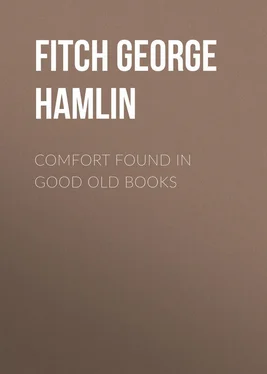George Fitch - Comfort Found in Good Old Books
Здесь есть возможность читать онлайн «George Fitch - Comfort Found in Good Old Books» — ознакомительный отрывок электронной книги совершенно бесплатно, а после прочтения отрывка купить полную версию. В некоторых случаях можно слушать аудио, скачать через торрент в формате fb2 и присутствует краткое содержание. Жанр: foreign_antique, foreign_prose, на английском языке. Описание произведения, (предисловие) а так же отзывы посетителей доступны на портале библиотеки ЛибКат.
- Название:Comfort Found in Good Old Books
- Автор:
- Жанр:
- Год:неизвестен
- ISBN:нет данных
- Рейтинг книги:4 / 5. Голосов: 1
-
Избранное:Добавить в избранное
- Отзывы:
-
Ваша оценка:
- 80
- 1
- 2
- 3
- 4
- 5
Comfort Found in Good Old Books: краткое содержание, описание и аннотация
Предлагаем к чтению аннотацию, описание, краткое содержание или предисловие (зависит от того, что написал сам автор книги «Comfort Found in Good Old Books»). Если вы не нашли необходимую информацию о книге — напишите в комментариях, мы постараемся отыскать её.
Comfort Found in Good Old Books — читать онлайн ознакомительный отрывок
Ниже представлен текст книги, разбитый по страницам. Система сохранения места последней прочитанной страницы, позволяет с удобством читать онлайн бесплатно книгу «Comfort Found in Good Old Books», без необходимости каждый раз заново искать на чём Вы остановились. Поставьте закладку, и сможете в любой момент перейти на страницу, на которой закончили чтение.
Интервал:
Закладка:
George Hamlin Fitch
Comfort Found in Good Old Books
Introduction
These short essays on the best old books in the world were inspired by the sudden death of an only son, without whom I had not thought life worth living. To tide me over the first weeks of bitter grief I plunged into this work of reviewing the great books from the Bible to the works of the eighteenth century writers. The suggestion came from many readers who were impressed by the fact that in the darkest hour of sorrow my only comfort came from the habit of reading, which Gibbon declared he "would not exchange for the wealth of the Indies." If these essays induce any one to cultivate the reading habit, which has been so great a solace to me in time of trouble, then I shall feel fully repaid.
This book is not intended for those who have had literary training in high school or university. It was planned to meet the wants of that great American public which yearns for knowledge and culture, but does not know how to set about acquiring it. For this reason I have discussed the great books of the world from De Quincey's standpoint of the literature of power, as distinguished from the literature of knowledge. By the literature of power the author of the Confessions of an English Opium Eater meant books filled with that emotional quality which lifts the reader out of this prosaic world into that spiritual life, whose dwellers are forever young.
No book has lived beyond the age of its author unless it were full of this spiritual force which endures through the centuries. The words of the Biblical writers, of Thomas à Kempis, Milton, Bunyan, Dante and others who are discussed in this book, are charged with a spiritual potency that moves the reader of today as they have moved countless generations in the past. Could one wish for a more splendid immortality than this, to serve as the stimulus to ambitious youth long after one's body has moldered in the dust?
Even the Sphinx is not so enduring as a great book, written in the heart's blood of a man or woman who has sounded the deeps of sorrow only to rise up full of courage and faith in human nature.
Comfort
Found in Good Old
Books
For the thirty years that I have spoken weekly to many hundreds of readers of The Chronicle through its book review columns, it has been my constant aim to preach the doctrine of the importance of cultivating the habit of reading good books, as the chief resource in time of trouble or sickness. This doctrine I enforced, because for many years reading has been my principal recreation, and I have proved its usefulness in broadening one's view of life and in storing up material from the world's greatest writers which can be recalled at will. But it never occurred to me that this habit would finally come to mean the only thing that makes life worth living. When one passes the age of forty he begins to build a certain scheme for the years to come. That scheme may involve many things – domestic life, money-getting, public office, charity, education. With me it included mainly literary work, in which I was deeply interested, and close companionship with an only son, a boy of such lovable personal qualities that he had endeared himself to me from his very childhood. Cut off as I have been from domestic life, without a home for over fifteen years, my relations with my son Harold were not those of the stern parent and the timid son. Rather it was the relation of elder brother and younger brother.
Hence, when only ten days ago this close and tender association of many years was broken by death – swift and wholly unexpected, as a bolt from cloudless skies – it seemed to me for a few hours as if the keystone of the arch of my life had fallen and everything lay heaped in ugly ruin. I had waited for him on that Friday afternoon until six o'clock. Friday is my day off, my one holiday in a week of hard work, when my son always dined with me and then accompanied me to the theater or other entertainment. When he did not appear at six o'clock in the evening I left a note saying I had gone to our usual restaurant. That dinner I ate alone. When I returned in an hour it was to be met with the news that Harold lay cold in death at the very time I wrote the note that his eyes would never see.
When the first shock had passed came the review of what was left of life to me. Most of the things which I had valued highly for the sake of my son now had little or no worth for me; but to take up again the old round of work, without the vivid, joyous presence of a companion dearer than life itself, one must have some great compensations; and the chief of these compensations lay in the few feet of books in my library case – in those old favorites of all ages that can still beguile me, though my head is bowed in the dust with grief and my heart is as sore as an open wound touched by a careless hand.
For more than a dozen years in the school vacations and in my midsummer holidays my son and I were accustomed to take long tramps in the country. For five of these years the boy lived entirely in the country to gain health and strength. Both he and his older sister, Mary, narrowly escaped death by pneumonia in this city, so I transferred them to Angwin's, on Howell Mountain, an ideal place in a grove of pines – a ranch in the winter and a summer resort from May to November. There the air was soft with the balsam of pine, and the children throve wonderfully. Edwin Angwin was a second father to them both, and his wife was as fond as a real mother. For five years they remained on the mountain. Mary developed into an athletic girl, who became a fearless rider, an expert tennis player and a swimmer, who once swam two miles at Catalina Island on a foolish wager. She proved to be a happy, wholesome girl, an ideal daughter, but marriage took her from me and placed half the continent between us. Harold was still slight and fragile when he left the country, but his health was firmly established and he soon became a youth of exceptional strength and energy.
Many memories come to me now of visits paid to Angwin's in those five years. Coming home at three o'clock on winter mornings after a night of hard work and severe nervous strain, I would snatch two or three hours' sleep, get up in the chill winter darkness and make the tedious five-hour journey from this city to the upper Napa Valley, in order to spend one day with my boy and his sister. The little fellow kept a record on a calendar of the dates of these prospective visits, and always had some dainty for me – some bird or game or choice fruit which he knew I relished.
Then came the preparatory school and college days, when the boy looked forward to his vacations and spent them with me in single-minded enjoyment that warmed my heart like old wine. By means of constant talks and much reading of good books I labored patiently to develop his mind, and at the same time to keep his tastes simple and unspoiled. In this manner he came to be a curious mixture of the shrewd man of the world and the joyous, care-free boy. In judgment and in mental grasp he was like a man of thirty before he was eighteen, yet at the same time he was the spontaneous, fun-loving boy, whose greatest charm lay in the fact that he was wholly unconscious of his many gifts. He drew love from all he met, and he gave out affection as unconsciously as a flower yields its perfume.
In college he tided scores of boys over financial straits; his room at Stanford University was open house for the waifs and strays who had no abiding-place. In fact, so generous was his hospitality that the manager of the college dormitory warned him one day in sarcastic vein that the renting of a room for a term did not include the privilege of taking in lodgers. His friends were of all classes.
Читать дальшеИнтервал:
Закладка:
Похожие книги на «Comfort Found in Good Old Books»
Представляем Вашему вниманию похожие книги на «Comfort Found in Good Old Books» списком для выбора. Мы отобрали схожую по названию и смыслу литературу в надежде предоставить читателям больше вариантов отыскать новые, интересные, ещё непрочитанные произведения.
Обсуждение, отзывы о книге «Comfort Found in Good Old Books» и просто собственные мнения читателей. Оставьте ваши комментарии, напишите, что Вы думаете о произведении, его смысле или главных героях. Укажите что конкретно понравилось, а что нет, и почему Вы так считаете.












